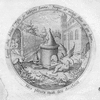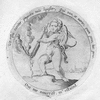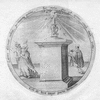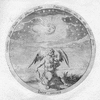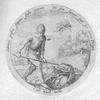C’est tard avise [18]
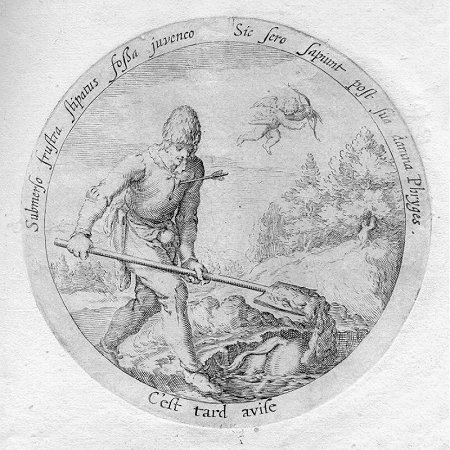
Ben ick niet wel beraen?1 is dat niet wel ghevonden?
Als ick gheschoten ben/ soo schudt2 ick eerst de wonden/
Verdroncken is mijn peert/ ick wercke dagh en nacht/
Ick vulle nu den put/ daer t’ peert in licht versmacht3.
Het is met my ghedaen/ ick mocht mijn moeyt wel laeten/
Als ick den arbeyt doe en mach hy my niet baeten/
Het is niet wel versint/ alst huys al is verbrandt
Het water dan eylaes te nemen in de handt.
Als ick gheschoten ben/ soo schudt2 ick eerst de wonden/
Verdroncken is mijn peert/ ick wercke dagh en nacht/
Ick vulle nu den put/ daer t’ peert in licht versmacht3.
Het is met my ghedaen/ ick mocht mijn moeyt wel laeten/
Als ick den arbeyt doe en mach hy my niet baeten/
Het is niet wel versint/ alst huys al is verbrandt
Het water dan eylaes te nemen in de handt.

Translations
 |
Goede raad is te laat. |
 |
Good advice comes too late. |
 |
Als het kalf verdronken is, dempt men vergeefs de put. Zo worden Phrygiërs pas na schade en schande wijs. |
 |
It's too late to lock the stable door once the horse has bolted. Thus the Phrygians only learn by bitter experience. |
Literature
Sources and parallels
- Same emblem in 1601 edition: C’est tard avisé [18] (in: Daniël Heinsius, Quaeris quid sit Amor (c. 1601))
[Compare
![Compare [compare]](/static/images/compare2.gif) ]
]
-
Parallel in the 1616 edition: motto and subscriptio the same, pictura is mirrored and more detailed in the background:
C'est tard avisé. [42] (in: Daniël Heinsius, Ambacht van Cupido, from: Nederduytsche poemata (1616))
[Compare
![Compare [compare]](/static/images/compare2.gif) ]
]
References, across this site, to this page:
- C’est tard avisé [18] (in: Daniël Heinsius, Quaeris quid sit Amor (c. 1601))
- C'est tard avisé. [42] (in: Daniël Heinsius, Ambacht van Cupido (1613))
- C'est tard avisé. [42] (in: Daniël Heinsius, Ambacht van Cupido, from: Nederduytsche poemata (1616))
Iconclass
A farmer is filling up the pit in which his horse has drowned; an arrow, which was shot by Cupid, is sticking out of his chest- pit, hole
[25H115]

- violent death by arrow(s) - EE - death not certain; wounded person
[31EE23461]

- burial (+ variant)
[42E23(+0)]

- farmers
[46A14]

- horse (+ dying animal; death of animal; dead animal)
[46C13141(+763)]

- tools, aids, implements ~ crafts and industries (with NAME)
[47D8(SPADE)]

- Absent-mindedness (+ emblematical representation of concept)
[52AA2(+4)]

- Negligence; 'Negligenza' (Ripa) (+ emblematical representation of concept)
[54AA2(+4)]

- (personifications and symbolic representations of) Love; 'Amore (secondo Seneca)' (Ripa) (+ emblematical representation of
concept)
[56F2(+4)]

- proverbs, sayings, etc. (with TEXT)
[86(C'EST TARD AVISE)]

- Cupid shooting a dart
[92D1521]

![[H O M E : Emblem Project Utrecht]](/static/images/rd-small.gif)




